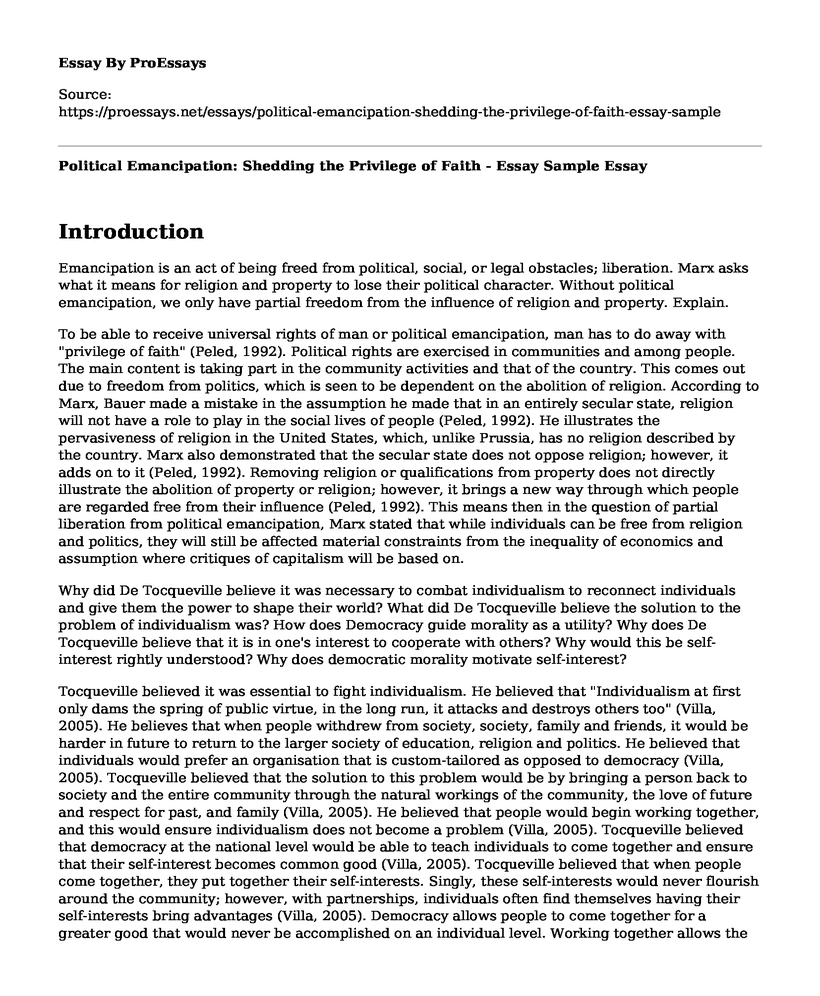Introduction
Emancipation is an act of being freed from political, social, or legal obstacles; liberation. Marx asks what it means for religion and property to lose their political character. Without political emancipation, we only have partial freedom from the influence of religion and property. Explain.
To be able to receive universal rights of man or political emancipation, man has to do away with "privilege of faith" (Peled, 1992). Political rights are exercised in communities and among people. The main content is taking part in the community activities and that of the country. This comes out due to freedom from politics, which is seen to be dependent on the abolition of religion. According to Marx, Bauer made a mistake in the assumption he made that in an entirely secular state, religion will not have a role to play in the social lives of people (Peled, 1992). He illustrates the pervasiveness of religion in the United States, which, unlike Prussia, has no religion described by the country. Marx also demonstrated that the secular state does not oppose religion; however, it adds on to it (Peled, 1992). Removing religion or qualifications from property does not directly illustrate the abolition of property or religion; however, it brings a new way through which people are regarded free from their influence (Peled, 1992). This means then in the question of partial liberation from political emancipation, Marx stated that while individuals can be free from religion and politics, they will still be affected material constraints from the inequality of economics and assumption where critiques of capitalism will be based on.
Why did De Tocqueville believe it was necessary to combat individualism to reconnect individuals and give them the power to shape their world? What did De Tocqueville believe the solution to the problem of individualism was? How does Democracy guide morality as a utility? Why does De Tocqueville believe that it is in one's interest to cooperate with others? Why would this be self-interest rightly understood? Why does democratic morality motivate self-interest?
Tocqueville believed it was essential to fight individualism. He believed that "Individualism at first only dams the spring of public virtue, in the long run, it attacks and destroys others too" (Villa, 2005). He believes that when people withdrew from society, society, family and friends, it would be harder in future to return to the larger society of education, religion and politics. He believed that individuals would prefer an organisation that is custom-tailored as opposed to democracy (Villa, 2005). Tocqueville believed that the solution to this problem would be by bringing a person back to society and the entire community through the natural workings of the community, the love of future and respect for past, and family (Villa, 2005). He believed that people would begin working together, and this would ensure individualism does not become a problem (Villa, 2005). Tocqueville believed that democracy at the national level would be able to teach individuals to come together and ensure that their self-interest becomes common good (Villa, 2005). Tocqueville believed that when people come together, they put together their self-interests. Singly, these self-interests would never flourish around the community; however, with partnerships, individuals often find themselves having their self-interests bring advantages (Villa, 2005). Democracy allows people to come together for a greater good that would never be accomplished on an individual level. Working together allows the development of a greater good much more significant than one's self-interest.
References
Peled, Y. (1992). From theology to sociology: Bruno Bauer and Karl Marx on the question of Jewish emancipation. History of Political Thought, 13(3), 463-485.
Villa, D. (2005). Hegel, Tocqueville, and "individualism". The Review of Politics, 67(4), 659-686.
Cite this page
Political Emancipation: Shedding the Privilege of Faith - Essay Sample. (2023, May 21). Retrieved from https://proessays.net/essays/political-emancipation-shedding-the-privilege-of-faith-essay-sample
If you are the original author of this essay and no longer wish to have it published on the ProEssays website, please click below to request its removal:
- Essay on Documentary Analysis: 13th (2016), The Mask You Live In (2015)
- Essay on Dangers in Police Realized As They Die In Line of Duty
- Private Contractors in Combat Environments Paper Example
- Congress Should Amend the Patent Act - Argumentative Essay
- Literary Analysis Essay on Jones' Book
- Research Paper on U.S. Presidential Elections: Transforming the American Dream
- Buying American: The US Policy of Protectionism - Essay Sample







